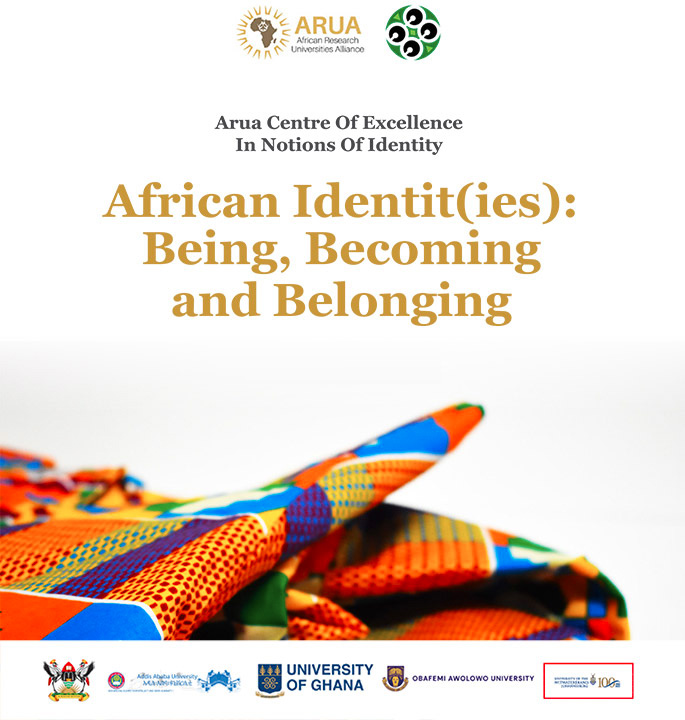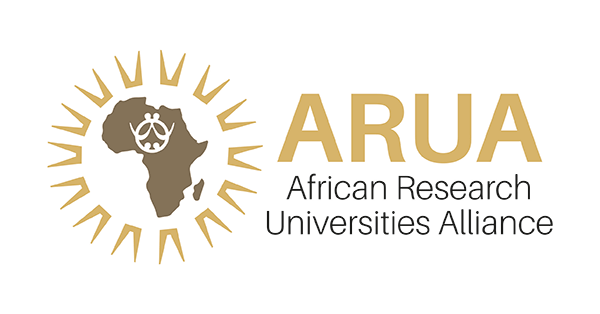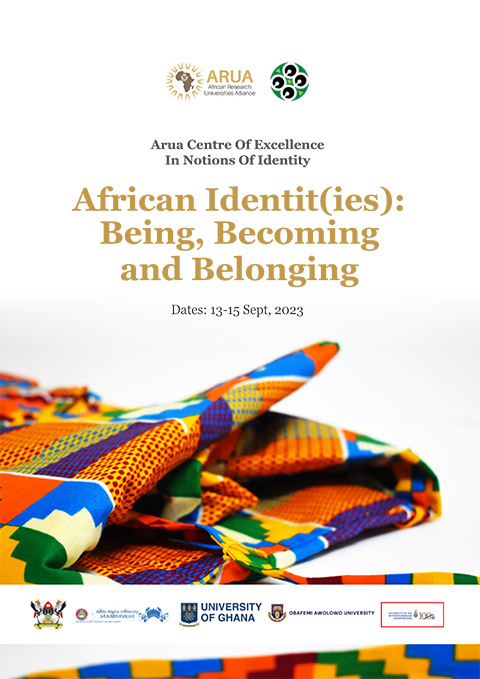
NOTE: The Area Centre of Excellence in Notions of Identity - African Identit(ies): Being, Becoming and Belonging Conference has been postponed to early 2024. More information will be communicated soon.
1. Background:
Identity is at the heart of the current complexities affecting Africa. Challenges emanating from its post-colonial state, neoliberal and post austerity lifestyles, conflict and post conflict situations, environmental challenges and resilience therein, all, individually and together, arise from, and raise issues of identity, authenticity originality and much more. How do all these challenges affect how we experience, become and belong to Africa? What are the different identities constructed, why and how are they experienced and deployed? Which ones are resilient and which ones are not? How and why are they resilient or not resilient? What does identity mean to Africans on the continent and beyond? How are they (re)constructed and how does this shape their experiences in the varied contexts? The thematic area of Notions of Identity in Africa belies many development agenda and is a key strategy to reinvigorating intellectual life in African countries from a socio-economic and cultural perspective. Identities is key to the attainment of the African Union Agenda 63 and SDG Goal 17 relating to strong institutions and partnerships for the delivery of the 17 SDGs.
Identity may be thought of in ontological terms - that is, asking what it is that identities do in structuring political, sociological, cultural and economic existence. That is the imperatives, meanings and existential production of politicised identities. In historical terms, we may further inquire into the ways in which identities structure questions of belonging and determine ways in which claims directed towards the state become legitimised or conversely, are rendered illegitimate. In what ways do (politicised) identities construct, deconstruct and reconstruct certain people? Furthermore, if the condition of coloniality signifies continuities or the interdeterminancy between colonial modernity and its (disenfranchising) legacies in the postcolonial world, how might processes of decolonisation be understood as simultaneously implicated by colonising identities (e.g. gender, race, ethnicity, sexuality, class, etc) and signifying their re-articulation in progressive ways? In other words, where does the possibility of redeploying identity as an emancipatory possibility lie? A further conundrum in which identity finds itself is in the identitiarian limitations it encounters within the liberal democracy. This is in part because liberal democracies tend to interpellate subjects on the basis of singular identities, and render as impossible bivalent identities, thus producing contradictions because the postcolonial condition on its part produces “intersectional” subjects. These multiple identities compete, coexist and often contradict one another, and the ways in which this happens deserve critical scholarly inquiry. We seek in respect of the above thematic concerns, to explore the emancipatory possibilities that a more radical engagement with the notion of identity/identity politics may hold for colonial modernity’s “Other”.
2. About the ARUA CoE in Notions of Identities:
The major motivation for African Research Universities Alliance (ARUA) is to catalyse intellectual life of African countries. The ARUA Centres of Excellence (CoE) are a team, a shared facility or an entity that provides leadership, best practices, research support and/or training in a focus area. Specifically, the ARUA CoE in Notions of Identity was launched in 2019 to undertake research, capacity strengthening and knowledge transfer to drive theorisation and conceptualisation of African knowledge systems around identity formation and (re)construction. The Centre comprises Makerere University as the hub and five spokes universities including University of Ghana, Obafemi Awolowo University, University of Rwanda, University of Witwaterand and Addis Ababa University. In addition to these, the UKRI capacity building grant brought on board the Universities of Ibadan, University of Western Cape and enabled the CoE to recruit 18 early career researchers from the 6 participating institutions all working on different topics relating to parenting identities and children’s welfare.
3. The Focus of the International Conference on Identities in Africa:
The 2023 ARUA international conference on African notions of identit(ies) seeks to bring together scholars, practitioners, policy makers and activists from African and beyond, to enable a discussion on (re)constructions and experiences of identity in Africa and in the Diaspora. Most contemporary scholarship on identities is applied. There is need to engage more with the concept from theoretically and conceptually, without forgetting its multi-faceted and multi-dimensional nature. The conference will illuminate the different themes and ways to study and write about identities in Africa, as being, becoming and belonging. This conference is intended to provide an opportunity for the CoE’s researchers, particularly early career researchers, to share their research work with a wider audience, . To give our early career researchers an opportunity to learn from senior scholars, we are issuing this call inviting scholars and researchers working on different themes relating to African identities to participate in the conference.
The aim of the conference, therefore, is to explore key research themes in African research identities research.
The specific objectives are:
- To convene researchers in African identities to share their research and scholarly experiences
- To highlight the theoretical, conceptual and methodological themes relating to the study of African notions of identity
- To theoretically, conceptually and methodologically ground the Centre’s and other early career researchers in studying identities
- Provide early career researchers with an opportunity to share their work
- Critically analyse how African identities have been deployed
The key questions the Conference will seek to answer include:
- African, Africanness and Africanicity: What does it mean to be African conceptually, theoretically and pragmatically?
- Black and African identities
- How best can identities be studied, researched and written about?
- Being African, Becoming African and Belonging to Africa: How do we experience, become and belong to Africa?
- Anthropological Identities: How has the “other” constructed the African and with what implications?
- Changing notions of Identity: How have the notions of being African been constructed over time? How have they changed?
- Identity and population registration: What is the impact of identification on identity?
- Culinary Identities: Food and being
- Identity and Fashion: How does dress/clothing construct us?
- Art, Culture and Identity: An exploration of portrayals over time through contemporary and historic art and culture
- Gendered Identities: How have new developments on the continent shaped maleness and femaleness?
- Politics and Identity: What political processes have shaped which identification processes and vice versa.
- Age and identity: How does age (youthfulness, adulthood and old age) shape constructions of identity? What are the challenges?
- Health and Wellbeing: What is the nexus between notions of health, wellbeing and identity
- Economic identities, aid and more: How have development paradignms shaped the African experience?
- Majorities, Minorities, etc: Shifting notions of majority and minority
- Identities and moralities: On the question of sexuality, morality and being
- Diasporan identities: How does externalisation from the continent affect identity and identification?
- Parenting and identity in Africa
4. Key thematic areas will include:
Panels and paper abstracts are invited along the following thematic areas:
- Studying identities as theoretical and conceptual
- Researching identities: Methodology and Method
- Identity politics and politics of identity
- African Feminist and Gender politics
- Group identities
- Applied identities (Social Economic, Culture, Religious, etc)
- Identity and Development
5. Conference Structure:
This will be a blended conference, held over three days and will comprise the following two major parts:
- Open conference to successful presenters on any of the conference themes which will run for three full days
- A workshop for the UKRI Early Career Researchers (ECRs) of the Capacity Building Grant along the side-lines will run three days to the to enable the ECRs to interface with each other and with the IAB. This will enable the ECRs to join the main conference once it starts
- The IAB will be held on the afternoon of the second day of the workshop, to enable IAB members to meet the ECRs and participate in the conference
6. Conference Dates:
The conference will be held from 13th – 15th September 2023. An additional day will be extended for the CoE’s international advisory board meeting, where they will meet with the CoE’s early career researchers.
7. Venue:
The conference will be held in the Yusuf Lule Central Teaching Facility, Makerere University, Kampala, Uganda. A list of hotels will be documented to give conference attendees a wide choice of potential accommodation options.
8. Conference Outputs:
The outputs of the conference will include:
- A book of abstracts
- A conference report
- Two edited volumes including a special journal issue and book
- A research agenda for the CoE in African identities
- A joint research funding grant application by the CoE partners
9. Participation and Submission of Abstracts and Papers
Interested participants are encouraged to submit their up to one page abstracts to the conference organizing committee at https://coeidentities.mak.ac.ug/call-for-abstracts no later than 15th April 2023 [Submission is open].
10. Key Conference Timelines
15th April 2023 – Abstracts submission Deadline:
15th May 2023 – Notification of decision of conference committee:
15th June 2023 – Full paper submissions:
NOTE: New Conference Timelines will be Announced
References:
Eze, C. (2014), Rethinking African culture and identity: the Afropolitan model, Journal of African Cultural Studies, Vol 26(2), pp. 234-247
Gehrmann, S. (2016), Cosmopolitanism with African roots. Afropolitanism's ambivalent mobilities, Journal of African Cultural Studies, Vol. 28(1), pp. 61-72
Greenstein, R. (1996), Identity, Race, History: South Africa and the Pan-African Context, Seminar Presented at the Institute for Advanced Social Research, University of Witwatersrand.
Konadu, K. (2004), The Cultural Identity of Africa and the Global Tasks of Africana Studies, African Studies Quarterly, Vol.7(4), pp. 33-40
Leildé, A.C, (2008), Changing Identities in Urban South Africa: An Interpretation of Narratives In Cape Town, Dissertation presented for the Degree of Doctor of Philosophy (Sociology) at the University of Stellenbosch
Ujang, N. and Zakariya, K. (2015), The Notion of Place, Place Meaning and Identity in Urban Regeneration, Procedia – Social and Behavioural Sciences, Vol. 170, pp. 709 -717.
Versluys, E. (n.d), The Notion of Identity in Discourse Analysis: Some 'Discourse Analytical' Remarks by Eline Versluys,


